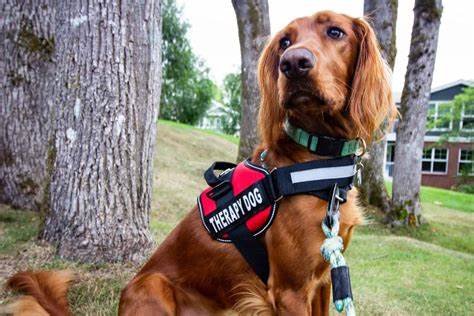The Role of Therapy Dogs in Mental Health Recovery
In recent years, the importance of mental health has become more widely recognized, and alongside traditional therapies, non-traditional approaches, such as animal-assisted interventions, have gained significant attention. Among these, therapy dogs stand out as powerful allies in promoting emotional well-being and aiding mental health recovery. These trained canines are not only capable of providing comfort but can also play an essential role in the healing process for individuals struggling with various mental health conditions. In this article, we will explore how therapy dogs help individuals manage mental health challenges, the benefits they provide, and why they are such an invaluable resource in therapeutic settings.

What is a Therapy Dog?
Before delving into their role in mental health recovery, it’s essential to understand what constitutes a therapy dog. Therapy dogs are specifically trained to offer emotional support, comfort, and companionship to individuals in hospitals, nursing homes, schools, and mental health facilities. Unlike service dogs, which assist people with specific physical disabilities, therapy dogs improve people’s emotional and psychological well-being in various therapeutic settings.
Therapy dogs are trained to respond to the needs of their handlers and those they interact with, helping to reduce anxiety, promote relaxation, and alleviate feelings of isolation.
How Therapy Dogs Aid Mental Health Recovery
The presence of a therapy dog can profoundly impact someone dealing with mental health challenges. Dogs are empathetic and nonjudgmental by nature, which allows them to form deep connections with people. Their role in mental health recovery can vary depending on the individual’s needs, but the overall benefits are clear.
1. Reducing Anxiety and Stress
One of the most immediate benefits therapy dogs provide is stress reduction. Their presence has been shown to lower cortisol levels (the body’s primary stress hormone) while simultaneously increasing the production of oxytocin, a hormone linked to feelings of relaxation and bonding. Petting or interacting with a dog can help calm an anxious mind, promoting security and well-being.
For individuals with anxiety disorders, panic attacks, or PTSD, therapy dogs serve as an emotional anchor, providing a sense of stability and comfort in situations that may feel overwhelming. The unconditional nature of a dog’s love helps ground the individual, making it easier to manage stress and regain emotional control.
2. Providing Emotional Support and Companionship
Loneliness and isolation are common experiences for individuals struggling with mental health conditions such as depression, social anxiety, or post-traumatic stress disorder (PTSD). Therapy dogs offer a unique type of companionship that can combat feelings of loneliness. The bond between humans and dogs is incredibly therapeutic, and the simple act of having a dog to care for can help individuals feel needed, valued, and less isolated.
Dogs are instinctively attuned to human emotions and can often sense when a person is upset, anxious, or depressed. In these moments, they provide physical comfort through close contact, such as resting their head on a person’s lap or leaning against them. This connection can foster emotional healing and help people feel more supported during their recovery journey.
3. Promoting Positive Behavioral Changes
Therapy dogs are trained to be a calming presence, which can lead to positive behavioral changes in individuals. When a person is struggling with mental health challenges, they may experience heightened emotional responses or difficulty regulating their emotions. The steady, consistent companionship of a therapy dog encourages a person to develop healthier coping mechanisms, such as engaging in calming activities, improving communication skills, and fostering a greater sense of self-awareness.
Additionally, caring for a therapy dog—such as feeding, grooming, and walking—can help individuals structure their daily routines. This sense of responsibility can be especially beneficial for those experiencing symptoms of depression, as it encourages them to remain active and engaged, even during difficult periods.
Conclusion
Therapy dogs are a valuable resource in mental health recovery, offering a wide range of benefits for individuals struggling with emotional or psychological challenges. From reducing stress and anxiety to providing companionship and promoting social interaction, these dogs play an instrumental role in supporting emotional healing. Whether working in hospitals, schools, mental health facilities, or private therapy settings, therapy dogs offer unique, compassionate care that is often transformative for those they assist.
If you or someone you know is dealing with mental health issues, consider the positive influence that a therapy dog might have. These wonderful animals are not just pets—they are dedicated, empathetic partners in the journey toward mental wellness.








